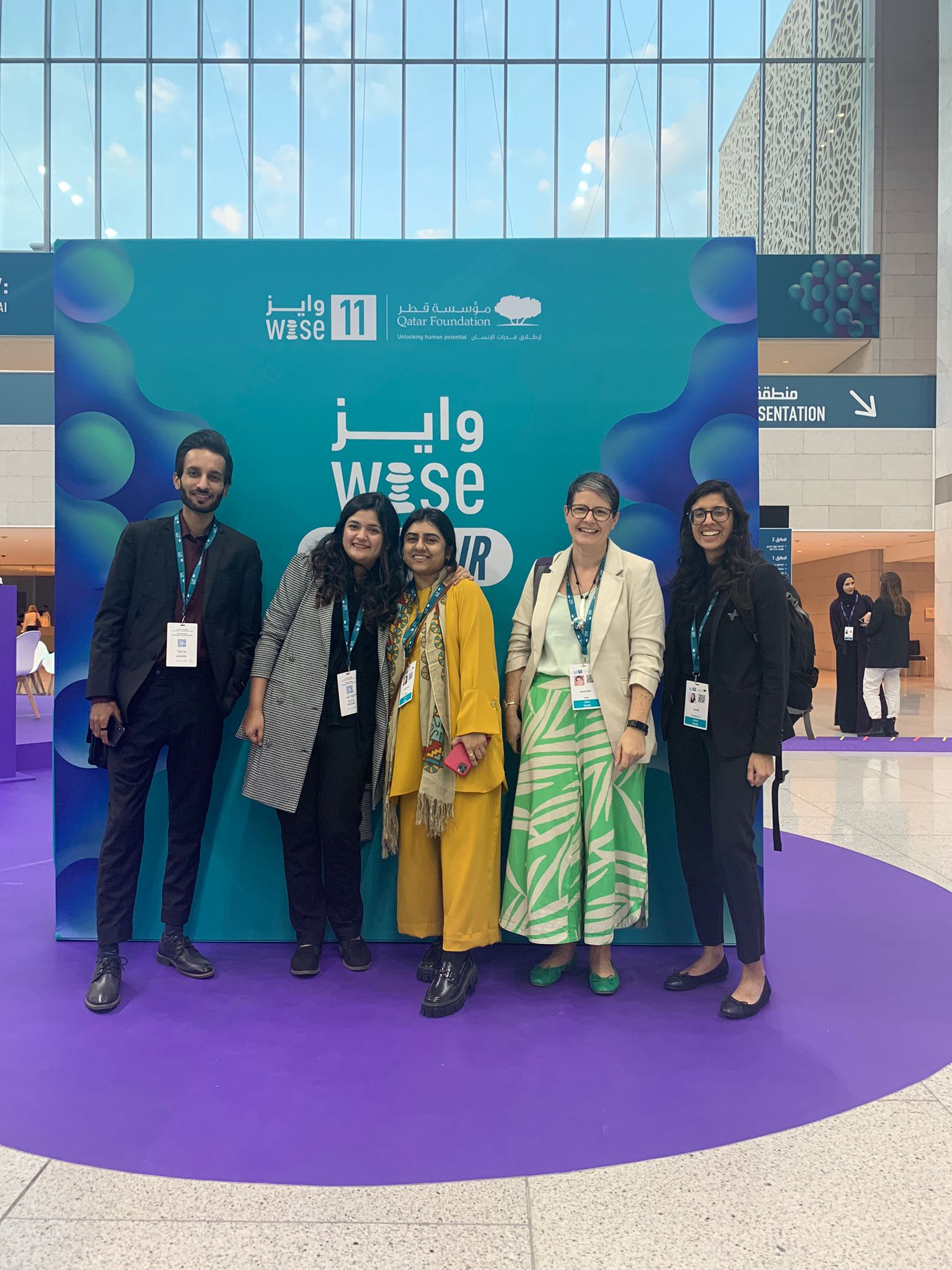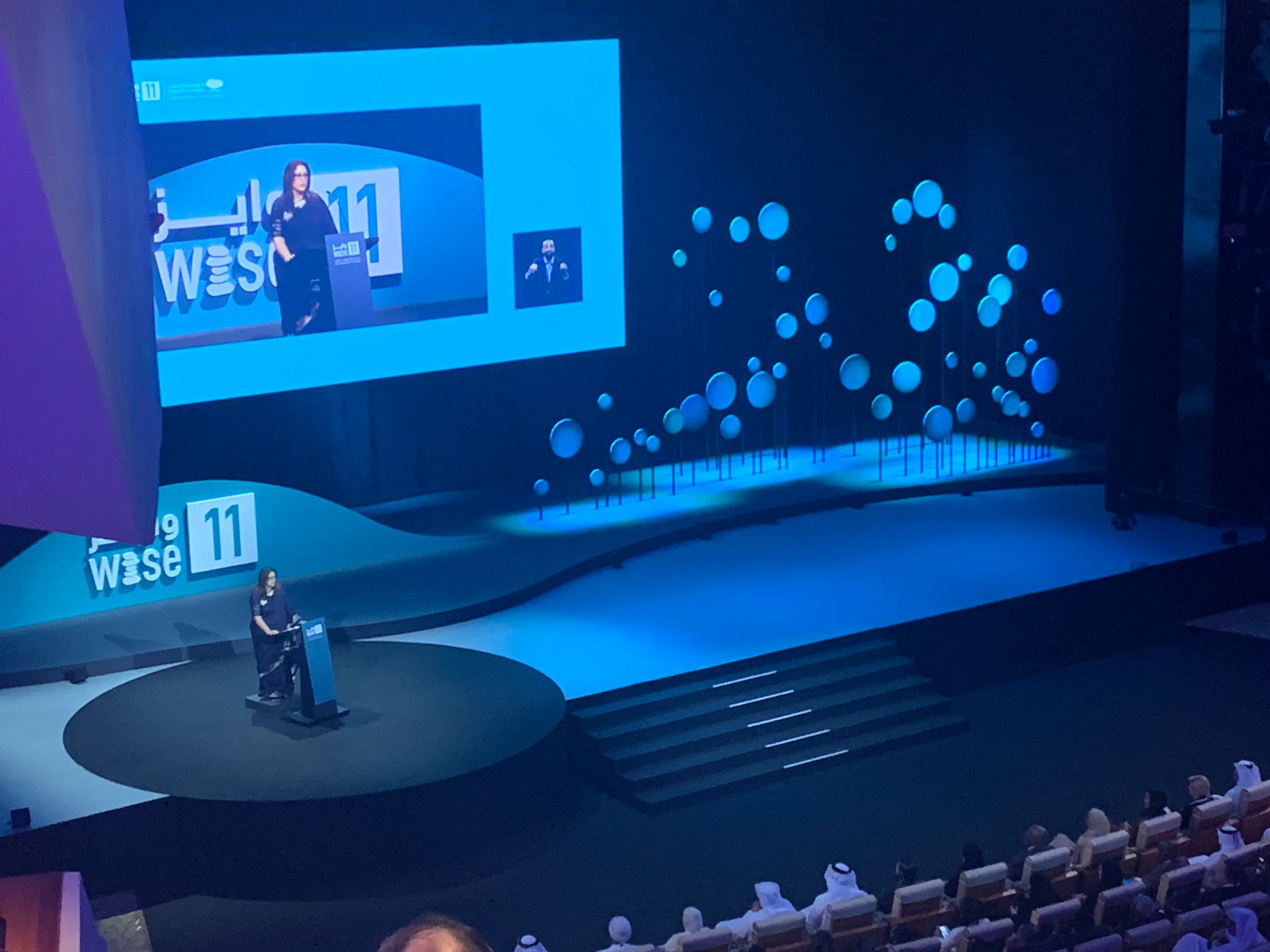The Global Schools Forum (GSF) recently attended the 2-day World Innovation Summit for Education (WISE) 2023 in Doha, Qatar. In alignment with its theme of ‘Creative Fluency: Human Flourishing in the Age of AI’, the summit raised questions on pertinent topics like the role of AI in education systems, education in times of war, greening education, and access to higher education amongst others. The summit gathered practitioners, policymakers, administrators, scientists, and students from across the globe, who shared their insights on the themes through a mix of panel discussions, master classes, and roundtables.

Organisations in GSF’s community, Taleemabad and Dignitas, at the WISE Summit
Here are our key takeaways from the session:
- Artificial intelligence (AI) will play a key role in shaping education programs in the future: The summit started with a compelling talk by Nina Schick, an expert in generative AI, who noted that we are the ‘tipping point’ in evolution as machines are fundamentally changing the way we live and work.
The sessions that followed discussed how the new age of AI presents unique opportunities to make teaching and learning more inclusive and effective. The Summit presented innovations where AI has played a positive role in transforming education. Safeena Hussian, the Founder of Educate Girls, won the Wise Prize for Education. During her acceptance speech, Safeena shed light on their work on using AI technologies to support data and evidence collection to inform the organisations decision making. Raising the point that AI can be largely valuable and successful when used to support administrative/ system efficiencies in the context of low-middle-income countries.
In addition, Taleemabad from Pakistan and Rocket Learning from India stood out with their low-tech solutions. Taleemabad is using technology to reduce the administrative tasks of teachers by supporting with the generation of customised lesson plans, assessments, and videos. While Rocket Learning is using WhatsApp bots to send learning activities, games, and homework assignments to teachers reducing their burden to create educational content and empowering parents to be much more involved in their child’s education. Beyond their distinct AI-driven approaches to personalized learning, both programs remained human-centred in its approach. It further emphasized that teachers would continue to play a critical role in developing students' learning, and emotional intelligence, and ensuring their well-being. In a panel, UNESCO also highlighted that human interactions and collaboration should remain central to education and is working on a AI competency frameworks for both teachers and students.
However, amidst the enthusiasm for innovation, concerns were voiced regarding potential AI misuse, inadequate data privacy regulations, the risk of discriminatory algorithms, and widening social gaps. A consistent theme throughout was the emphasis on collective efforts to address these challenges. Many panellists echoed a call to conscientiously integrate diverse regional perspectives, advocating for a discourse that transcends beyond the Western standpoint.
Conversations about AI in education also extended to higher education, and an urgent call was made to equip students with skills that align with the demands of the future workforce. Conrad Wolfram, Co-founder and CEO of The Wolfram Group emphasized that more creativity is needed to meet the demands of technological developments of the future. He discussed how mathematics education has become disconnected from real-world applications and argued for a shift toward prioritizing the utilization of computational tools in education systems to address real-world challenges. Other discussions revolved around training students and educators on AI models and integrating such themes seamlessly into the learning curriculum. Qatar has adopted a national AI curriculum for K-12 aiming to prepare students for a workforce that will increasingly involve AI technologies and skills.

Safeena Hussian, the Founder of Educate Girls, on winning the WISE Prize for Education
- There is a need to prioritise education of displaced students: The Summit highlighted the urgent need to protect education to mitigate the worst effects of the war and better equip future generations. The Summit provided the platform to listen to and amplify the compelling personal narratives of children impacted by wars and conflicts. The narratives vividly illustrated the transformative power of education, showcasing its ability to withstand shocks and foster resilience. Discussions during the Summit also delved into key aspects of crisis emergency response, including educational recovery, trauma, and psycho-social-emotional learning. Furthermore, the conversations explored the pivotal role of technologies in conflict-affected communities, serving as a crucial medium for educational recovery.
The notable work of Ahlan Simsim, initiated in 2018, stood out for its support to young children in conflict-affected parts of the MENA region. Ahlan Simsim combines and integrates educational media resources, including the Ahlan Simsim TV show helping children with their intellectual and social-emotional development and improving long-term economic prosperity, health, and well-being. In addition to children, the program also targets caregivers of children ages 0 to 8 years, and supports them with child development, play, and parenting with tools and activities for follow-up.
- There is a crucial link between education and climate action: The overarching theme emphasized education for climate action and the pivotal role of climate education in ensuring climate justice. UNESCO explained why greening education is crucial and ways to equip learners with the knowledge, skills, attitudes, and behaviours to tackle climate change. UNESCO’s Greening Education Partnership, has rallied 81 countries round four critical areas of education: Greening schools, greening curricula, greening teacher training, and greening communities. The Summit also emphasised the power of intergenerational dialogue in education in advocating for a climate-resilient future. The call to meaningfully empower youth in addressing issues related to climate change education also became a cornerstone of many of the discussions.
The themes explored in the Summit resonate deeply with our commitment at GSF, inspiring us to further our dedication toward building an inclusive, resilient, and forward-thinking educational system. Through targeted initiatives, like the Evidence Hub on Early Childhood Education in emergencies, the Impact at Scale Labs and our work with communities we are determined to empower children, families and communities with the skills and knowledge needed for a more equitable, and sustainable future.

